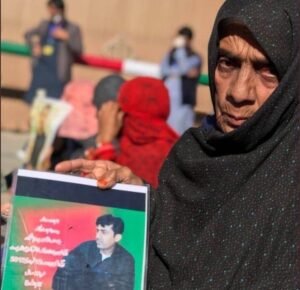Balochistan Protests: The Struggle Against Atrocities and Exploitation

A gathering of Baloch people in Gawadar, Baluchistan as part of Baluch National Gathering. Photo taken from @Fazila Baloch X account.
By Kadeem Baloch
The province of Balochistan in Pakistan has long been a focal point of political and social unrest. On July 27, 2024, this turbulence reached a tragic crescendo when a protest organized by the Balochistan Yakjehti Committee (BYC) turned violent, resulting in the deaths of at least three people and injuries to several others. This incident has once again spotlighted the ongoing issues of resource exploitation, forced disappearances, and the marginalization of the Baloch people.
The protest, intended to be a peaceful demonstration, quickly escalated into violence as security forces clashed with participants. According to reports from Dawn, two protesters were killed and several injured when their convoy was intercepted by security forces at the Talar check-post. Authorities claimed they acted in self-defense against a mob attack, a narrative often contested by the protestors.
In a separate clash on Gwadar’s Marine Drive, another protester lost their life and eight more were injured after security personnel used tear gas to disperse the crowd. These events underscore the volatile nature of the region and the extreme measures often employed by authorities to quell dissent.
The Baloch Rajee Muchi (Baloch National Gathering) aimed to address long-standing grievances of the Baloch people, including the exploitation of the province’s resources and the forced disappearances of activists. BYC leader Dr. Mahrang Baloch, speaking to the gathering in Gwadar, condemned the killings and demanded justice. She vowed that the struggle for Baloch rights and resource protection would continue unabated.
The protests have caused significant disruption in the province. Roads and highways, including the Quetta-Karachi highway, were blocked, bringing life in various southern Balochistan areas to a standstill. A complete shutter-down strike was observed in numerous towns and cities, illustrating widespread support for the protestors’ cause.
Political leaders from the Balochistan National Party (BNP-Mengal) and the National Party have condemned the use of force against the BYC supporters. BNP leader Sajid Tareen Advocate criticized the government for marginalizing Baloch and Pashtun people, leading to increased tensions and pushing the population toward armed resistance. National Party leaders Aslam Baloch and Kalsoom Niaz Baloch blamed the provincial government, led by Chief Minister Sarfraz Bugti, for the political instability, accusing it of deliberately spreading unrest.
Amnesty International has also called on Pakistani authorities to lift the internet shutdown in Balochistan and to facilitate peaceful protests by removing road blockades. The organization emphasized the government’s obligations under domestic and international human rights laws to allow freedom of movement and peaceful assembly.
The ongoing conflict in Balochistan has disproportionately affected women, especially those whose family members have been forcibly disappeared. Bibi Nazhatoon, the mother of missing activist Sammi Deen Baloch, marked the 15th anniversary of her husband’s disappearance with a poignant reflection on her loss. For over a decade, she has lived in a state of uncertainty, not knowing if she is a widow, a fate shared by many Baloch women.
The psychological and emotional toll on these women is immense. According to a recent report, 197 cases of missing persons were reported in the first half of 2024 alone, with the majority from Balochistan. The government’s failure to address these disappearances exacerbates the suffering, leaving families in a perpetual state of limbo.
The Balochistan conflict is part of a larger pattern of political violence affecting women globally. A United Nations report from 2023 noted a significant increase in political violence targeting women in conflict-ridden countries. Balochistan is no exception, with women bearing the brunt of the ongoing strife.
The story of Bibi Nazhatoon and others like her highlights the human cost of the conflict. Women like Nazhatoon, whose identities have been reduced to their relationships with missing family members, continue to fight for justice and recognition. Their plight underscores the need for a resolution that addresses both the political and humanitarian dimensions of the Balochistan crisis.
The recent protests in Balochistan reflect deep-seated grievances and a yearning for justice among the Baloch people. As long as issues of resource exploitation, forced disappearances, and political marginalization persist, so too will the struggle of the Baloch people. The international community must take note of these human rights violations and support efforts to bring peace and justice to Balochistan.
The author chooses a pseudonym. Kadeem Baloch is a freelance journalist based in Pakistan.
Note: The contents of the article are of sole responsibility of the author. Afghan Diaspora Network will not be responsible for any inaccurate or incorrect statement in the articles.










